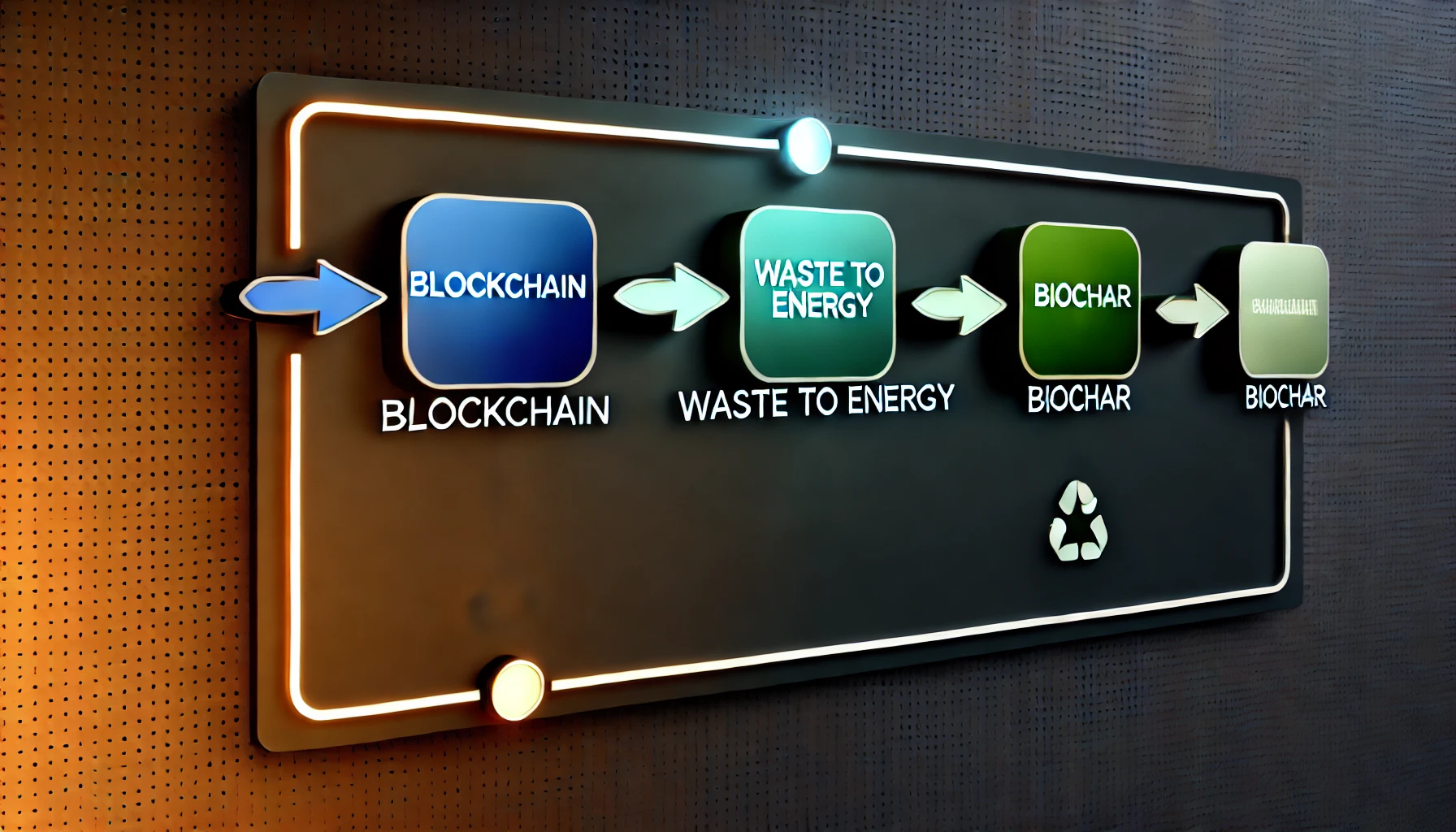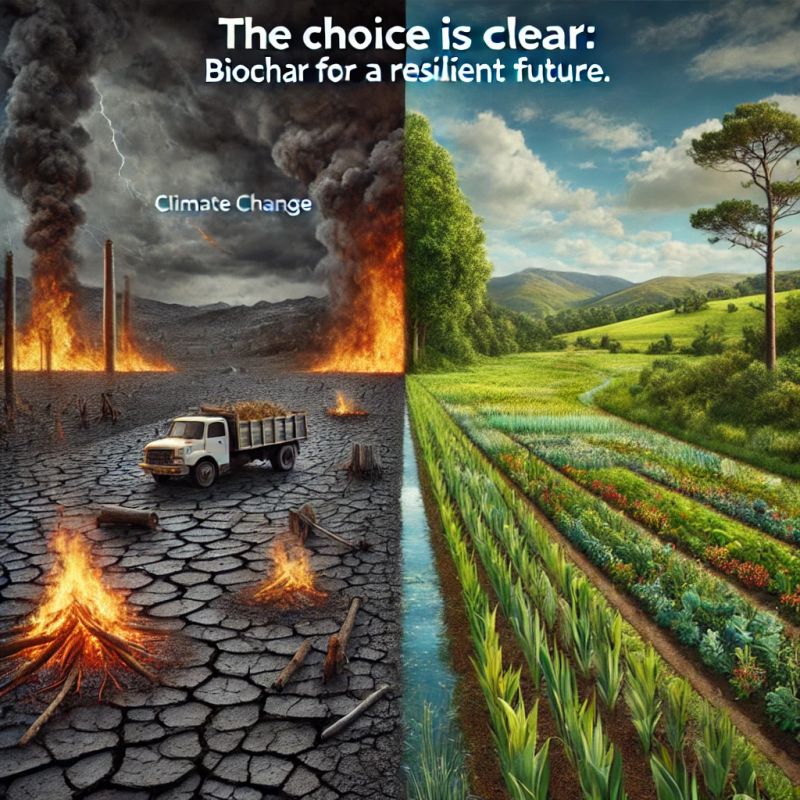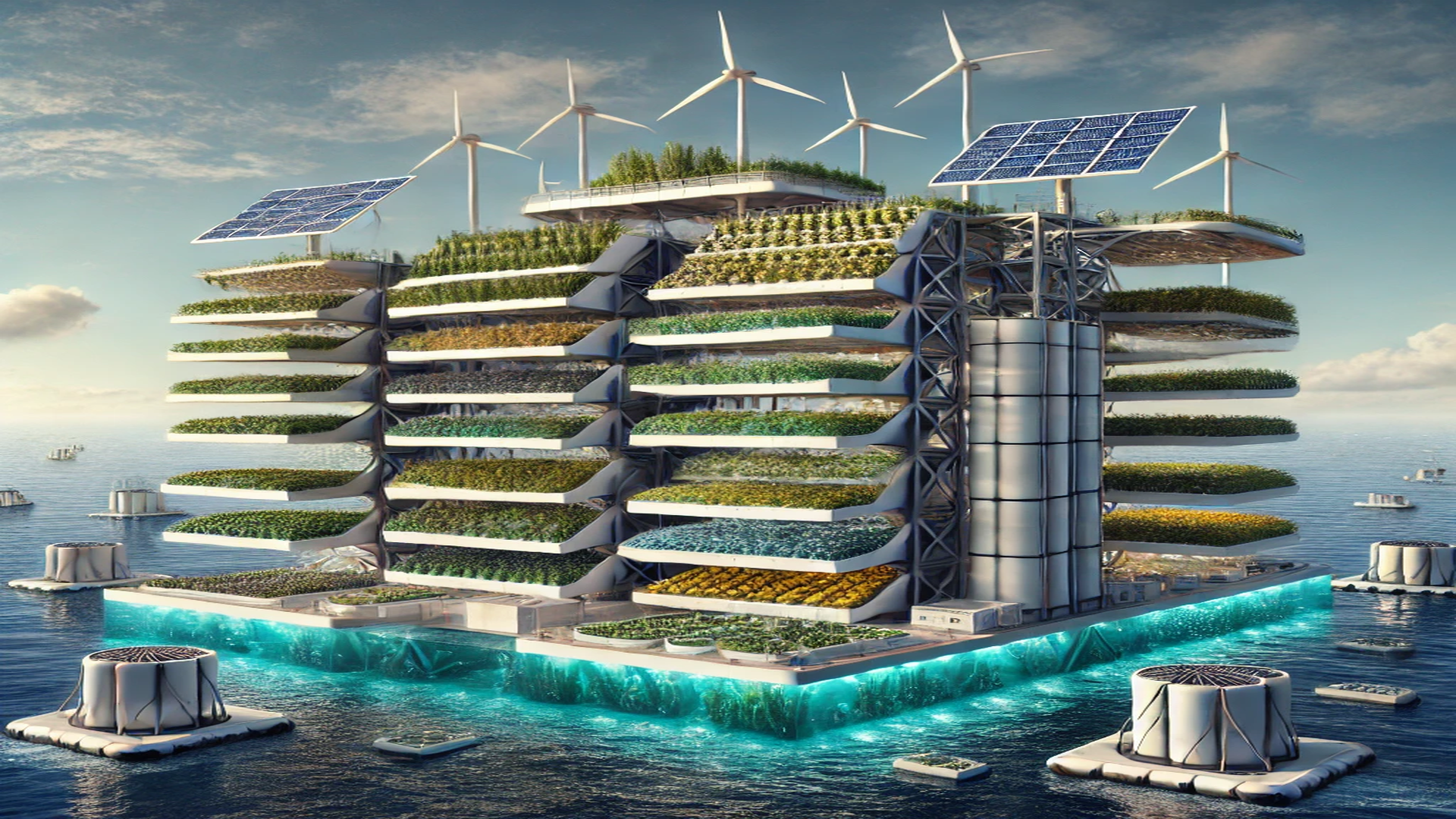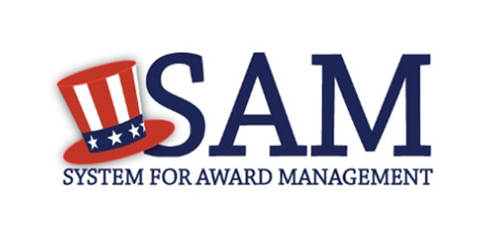Introduction
With climate change intensifying and global waste generation growing exponentially, innovative technologies are critical for addressing these challenges. Biochar, a stable carbon-rich material produced through the pyrolysis of organic waste, offers a promising avenue for long-term carbon sequestration while simultaneously improving soil health and mitigating greenhouse gas (GHG) emissions. When integrated with Waste-to-Energy (WtE) systems, biochar production not only 𝒅𝒊𝒗𝒆𝒓𝒕𝒔 𝒘𝒂𝒔𝒕𝒆 𝒇𝒓𝒐𝒎 𝒍𝒂𝒏𝒅𝒇𝒊𝒍𝒍𝒔 𝒃𝒖𝒕 𝒂𝒍𝒔𝒐 𝒆𝒏𝒉𝒂𝒏𝒄𝒆𝒔 𝒆𝒏𝒆𝒓𝒈𝒚 𝒑𝒓𝒐𝒅𝒖𝒄𝒕𝒊𝒐𝒏 𝒊𝒏 𝒂 𝒄𝒂𝒓𝒃𝒐𝒏-𝒏𝒆𝒈𝒂𝒕𝒊𝒗𝒆 𝒎𝒂𝒏𝒏𝒆𝒓
However, to fully realise the potential of biochar in carbon markets and environmental reporting, traceability and verification are essential. Blockchain technology offers a powerful solution, providing an immutable and transparent ledger to verify biochar's carbon sequestration potential. By using blockchain, we can ensure the credibility of carbon offsets, enhance regulatory compliance, and unlock new revenue streams, particularly through carbon credit markets
TOL Biotech and its associated partners and scientists have been at the forefront of these innovations, combining cutting-edge biochar research, sustainable waste management, and blockchain technology. This blog explores how blockchain can verify biochar-based carbon sequestration from WtE systems, offering a compelling case for governments and corporations to adopt this technology as part of their climate strategies
Scientific Foundations of Biochar for Carbon Sequestration
Biochar has been studied extensively for its ability to sequester carbon and enhance soil quality. It is produced through pyrolysis, a thermal decomposition process of organic matter in an oxygen-limited environment. The carbon in biochar is resistant to degradation, allowing it to remain stable for centuries to millennia. This makes biochar a key component in carbon sequestration strategies, with added environmental benefits when integrated into soil
Carbon Retention and Stability
- Carbon Sequestration Potential - Scientific studies confirm that biochar can retain up to 90% of the carbon present in the original biomass feedstock. For example, biochar produced at higher temperatures (>500°C) tends to exhibit greater carbon retention and stability, as confirmed by a study in Nature Communications (2018)
- Longevity - According to the International Biochar Initiative, biochar’s carbon can remain sequestered for 500 to 1,000 years, significantly reducing the carbon footprint of waste conversion processes when integrated into WtE systems
- Soil Benefits - Biochar improves soil fertility, increases water retention, and reduces the need for chemical fertilisers. Studies have shown that applying biochar to agricultural fields can increase crop yields by 10-40% depending on soil type and biochar properties
The Role of Waste-to-Energy Systems
WtE systems convert waste into energy through processes like gasification, incineration, or anaerobic digestion. These systems have the potential to divert significant volumes of waste from landfills while generating renewable energy. By incorporating biochar production into WtE processes, waste can be transformed into both energy and a valuable carbon sink, making WtE systems carbon-negative
Waste Management and Energy Production
- Global Waste Crisis - The World Bank estimates that global waste generation will reach 3.4 billion tonnes by 2050, a 70% increase from current levels. WtE systems are essential for managing this surge in waste while avoiding methane emissions from landfills, which are 25 times more potent than CO2 as a greenhouse gas
- Energy Generation - The global WtE industry currently generates approximately 2.5 GW of electricity annually. When combined with biochar production, WtE systems can play a pivotal role in reducing emissions while supplying renewable energy to the grid
- Carbon-Negative Energy - By producing biochar in the WtE process, these facilities can offset the CO2 emitted during energy production, making the entire process carbon-negative. A report by the European Biochar Foundation (2020) estimates that biochar can sequester approximately 3 tonnes of CO2 for every tonne of biochar produced
Blockchain for Traceability and Verification
While biochar offers enormous potential, its full value can only be unlocked if carbon sequestration can be accurately measured, verified, and recorded. This is where blockchain technology plays a crucial role. Blockchain provides a decentralised, secure, and immutable platform for tracking biochar production and its carbon sequestration throughout its lifecycle, from WtE plants to soil application. Qortal can plug the existing world gap in this regard
Benefits of Blockchain for Carbon Sequestration Verification
- Transparency and Accountability - Blockchain allows for transparent and tamper-proof records of biochar production, carbon content and sequestration, enabling governments and corporations to reliably claim carbon credits
- Real-Time Monitoring - Internet of Things (IoT) sensors can be integrated with blockchain platforms to provide real-time data on biochar production and carbon capture metrics, ensuring that data is continuously updated and verifiable
- Decentralised Validation - Blockchain enables multiple stakeholders—such as regulatory bodies, WtE operators, and carbon credit agencies—to access the same verified data, ensuring accuracy in reporting and preventing fraud
- Smart Contracts for Carbon Credits - Blockchain-based smart contracts can automate the issuance of carbon credits once specific criteria (e.g., carbon sequestration milestones) are met. This reduces transaction costs and increases the speed of trading in carbon markets
Case Study - TOL Biotech’s Leadership in Blockchain Integration with Qortal
Qortal & TOL Biotech have pioneered the integration of blockchain technology in biochar-based carbon sequestration, ensuring that all carbon captured in its WtE systems is transparently tracked. By working with blockchain developers and energy partners, Qortal & TOL Biotech have built a platform that allows real-time monitoring of biochar production across its facilities. This innovation has positioned the company as a leader in both the environmental tech and blockchain sectors
Economic Opportunities - Carbon Markets and Beyond
The monetisation potential of biochar-based carbon sequestration through blockchain is immense, particularly through participation in carbon markets. The growth of global carbon markets presents an opportunity for governments and corporations to generate revenue by selling verified carbon credits generated from biochar production
Global Carbon Market Growth
- Carbon Pricing and Market Size - The voluntary carbon market is projected to grow to $50 billion by 2030, according to McKinsey & Co. The ability to trace and verify biochar’s carbon sequestration potential makes it eligible for trading in both voluntary and compliance-based carbon markets.
- Carbon Credit Valuation - Each tonne of biochar produced can sequester approximately 1.8 to 3 tonnes of CO2, depending on the feedstock and pyrolysis conditions. At current carbon prices, which range from $10 to $50 per tonne of CO2, the sale of biochar-based carbon credits could yield significant revenue.
Corporate and Government Revenue Generation
- Carbon Credit Trading - TOL Biotech is testing the issue of issue blockchain-verified carbon credits for its biochar projects, enabling corporations to purchase these credits to offset their emissions. Governments could adopt similar models to meet their climate goals under the Paris Agreement.
- Public-Private Partnerships (PPP) - Blockchain-enabled biochar production in WtE systems can attract private investment by offering verifiable returns through carbon credits. Governments can incentivise private corporations to invest in these projects by offering tax breaks or subsidies.
- Tax Incentives and Green Bonds - Governments can issue green bonds or provide tax incentives for corporations adopting WtE systems with biochar production, particularly when blockchain verification guarantees the accuracy of carbon sequestration data.
Policy Implications and Global Case Studies
Governments around the world are increasingly recognising the role of biochar and blockchain technology in climate change mitigation. Countries with significant waste management challenges, such as India, China, and the United States, are ideal candidates for large-scale adoption of WtE systems with blockchain-verified biochar production
Successful Global Implementations
- Stockholm, Sweden - Stockholm has used biochar in urban green spaces, integrating biochar derived from WtE systems into soil management. Blockchain technology can enhance this system by verifying the carbon sequestration impact and providing a model for other cities.
- Australia’s Carbon Farming Initiative - The Australian government has encouraged biochar production through its Carbon Farming Initiative, offering carbon credits for verifiable sequestration projects. Blockchain adoption could streamline the verification process and boost participation.
- India’s Waste Management Sector - With a burgeoning waste crisis, India is a key candidate for WtE systems that produce biochar. Blockchain technology can ensure traceability and attract foreign investment into biochar projects. MagneGas and HyperFusion technologies will play the central part in this initiative, both of which are well proven technologies now awaiting large scale commercialisation.
TOL Biotech’s Contribution
TOL Biotech's leadership in integrating biochar production with WtE systems, combined with blockchain verification, sets a gold standard for carbon sequestration initiatives. By utilising blockchain’s ability to ensure verifiable, transparent data on biochar production, TOL Biotech has demonstrated the economic and environmental viability of this approach. As a result, TOL Biotech’s innovations have not only advanced the biochar and WtE sectors but have also created new opportunities for corporations and governments to participate in the growing carbon credit market.
Conclusion
The integration of blockchain technology into biochar-based carbon sequestration from WtE systems is a game-changer for both environmental sustainability and economic growth. With biochar’s ability to lock away carbon for centuries and blockchain’s transparent verification mechanisms, governments and corporations can confidently invest in this approach. TOL Biotech’s pioneering work with its partners in this field, highlights the immense potential for verified carbon credits, improved waste management, and long-term carbon sequestration, making this a compelling strategy for addressing climate change.






